How we did this
Pew Research Center conducted this study to understand how Americans are continuing to respond to the coronavirus outbreak and their assessments of how well U.S. leadership is working during this crisis. For this analysis, we surveyed 10,957 U.S. adults from April 29 to May 5, 2020. Everyone who took part is a member of Pew Research Center’s American Trends Panel (ATP), an online survey panel that is recruited through national, random sampling of residential addresses. This way nearly all U.S. adults have a chance of selection. The survey is weighted to be representative of the U.S. adult population by gender, race, ethnicity, partisan affiliation, education and other categories. Read more about the ATP’s methodology.
See here to read more about the questions used for this report, along with responses, and its methodology.
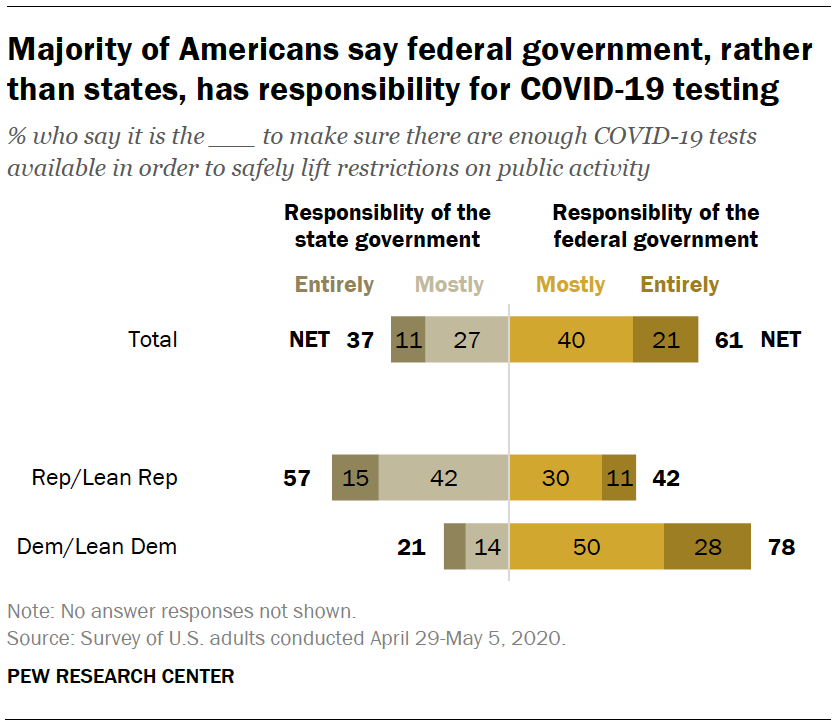
As a growing number of states ease stay-at-home restrictions imposed in response to the outbreak of the novel coronavirus, a majority of Americans (61%) say it is primarily the federal government’s responsibility to make sure there are enough COVID-19 tests in order to safely lift the restrictions.
Fewer (37%) say it is mainly the responsibility of state governments to ensure there is an adequate supply of tests.
Partisans differ sharply over which level of government bears the responsibility for COVID-tests: A sizable majority of Democrats and Democratic-leaning independents (78%) say this responsibility primarily falls on the federal government, with 28% saying it is entirely responsible for making sure there are enough tests. A smaller majority of Republicans and Republican leaners (57%) say this is primarily the responsibility of state governments.
Since late March, Republicans and Democrats have diverged in opinions about several aspects of the coronavirus crisis. There is a growing partisan gap in perceptions of the threat that COVID-19 poses to the health of the U.S. population. And Republicans, unlike Democrats, now express less positive views of how well state and local officials – and even widely praised public health officials, such as those at the Centers for Disease Control and Prevention (CDC) – are handling the outbreak.
However, local hospitals and medical centers draw overwhelmingly positive ratings from members of both parties for how they have responded to the coronavirus outbreak. About nine-in-ten Americans (88%), including nearly identical majorities in both parties, say hospitals and medical centers in their area have done an excellent or good job.
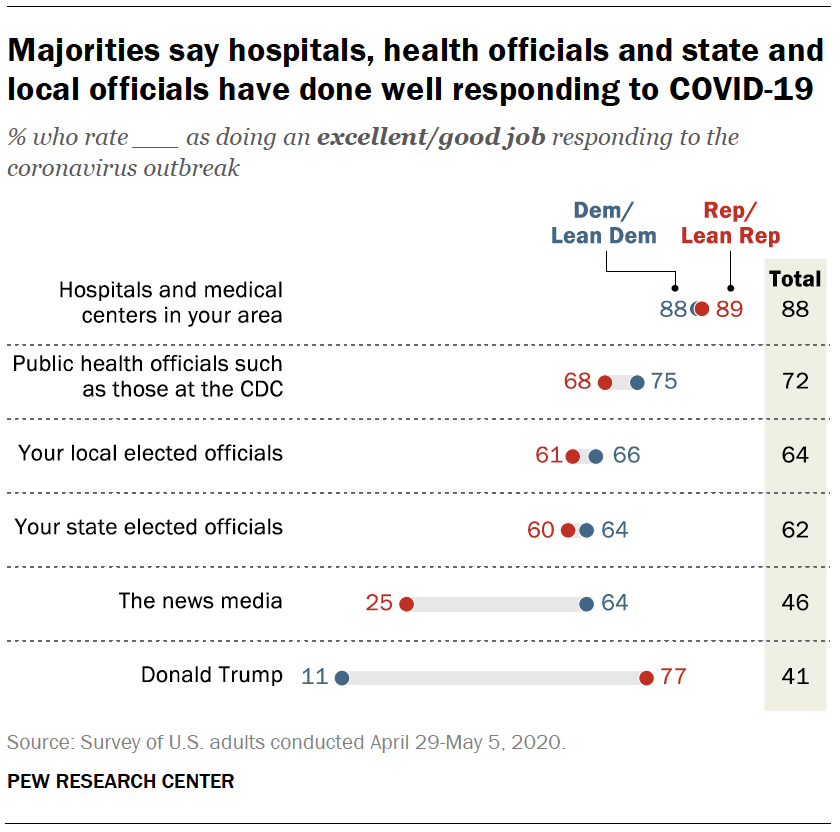
The new national survey by Pew Research Center, conducted April 29 to May 5 among 10,957 U.S. adults on the Center’s American Trends Panel, finds that the share of Republicans giving positive ratings to public health officials, such as those with the CDC, for their response to the coronavirus outbreak has declined 16 percentage points since a late March survey, conducted from the 19th to the 24th of that month.
Currently, 68% of Republicans and Republican-leaning independents say public health officials such as those at the CDC have done an excellent or good job in dealing with the outbreak, down from 84% nearly two months ago. Positive ratings for public health officials among Democrats and Democratic leaners are virtually unchanged at 75%.
Republicans also give lower ratings to state officials and local government officials than they did in March. And while a sizable majority of Republicans and Republican leaners (77%) say Donald Trump has done an excellent or good job in responding to the outbreak, this is somewhat lower than the 83% who said this two months ago. Democrats’ evaluations of Trump’s performance also are lower today (11%) than in March (18%).
The survey finds little overall change since March in the public’s views of the threat from the coronavirus outbreak to the nation’s economy and the health of the U.S. population. Currently, 88% of Americans say the outbreak is a major threat to the U.S. economy, while 64% view it as a major threat to the health of the U.S. population. (This survey was conducted before the release of the April jobs report showing the nation’s unemployment rate at 14.7%, the highest since the Great Depression.)
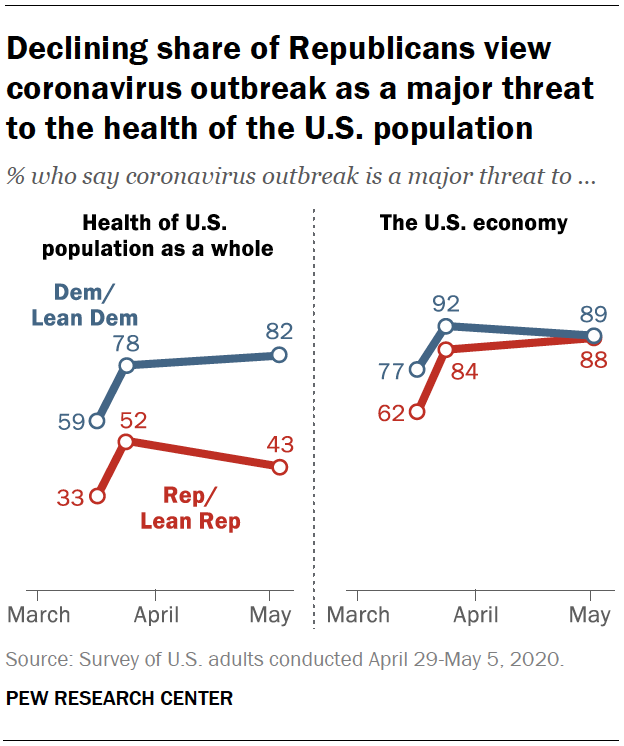
However, while nearly identical majorities of Republicans (88%) and Democrats (89%) say the outbreak is a major threat to the economy, Democrats are now nearly 40 percentage points more likely than Republicans to say it is major threat to the health of the population (82% of Democrats vs. 43% of Republicans).
Since late March, the share of Republicans who view the outbreak as a major threat to the nation’s health has declined 9 points, from 52% to 43%, while increasing slightly among Democrats, from 78% to 82%.
As has been the case since the coronavirus outbreak started, fewer Americans view the coronavirus outbreak as a major threat to their personal finances and health than to the nation’s economy and to the health of the population. Currently, 41% say the outbreak is a major threat to their personal finances, which is somewhat lower than the share who said this in late March (49%). Views of the threat the outbreak poses to personal health have changed little since then (currently 38%).
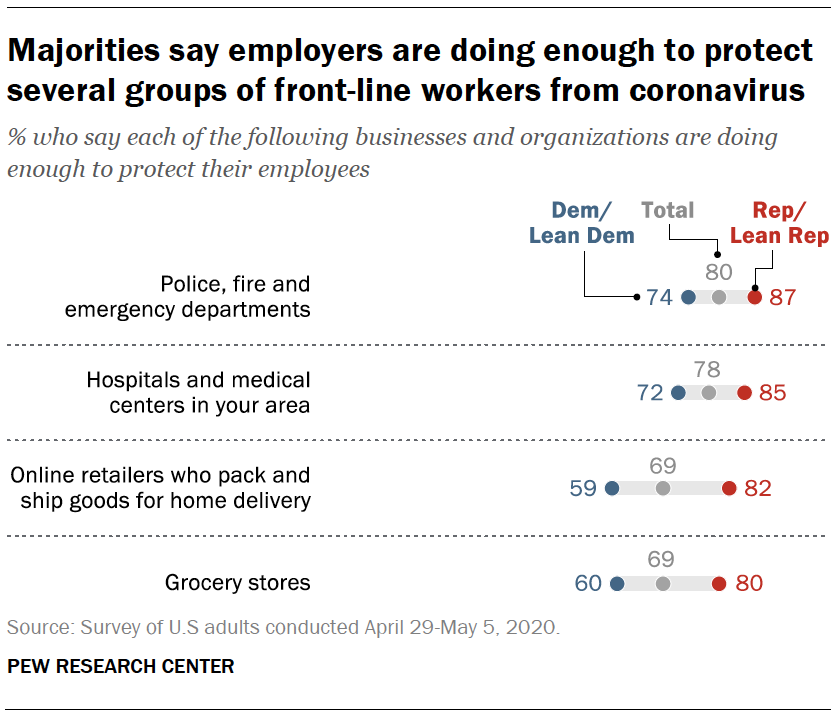
While many businesses closed as social distancing measures and stay-at-home orders were put in place across the United States, essential organizations and businesses such as hospitals, police stations, online retailers and various grocery stories remained open. Majorities of the public say these business and organizations are doing enough to protect these essential workers.
Large majorities say police, fire and emergency departments (80%) and local hospitals and medical centers (78%) are doing enough to protect their employees. Nearly seven-in-ten (69% each) say the same about online retailers and grocery stores.
While these views are widely shared by the public overall, Republicans are more likely than Democrats to say all four groups of employers are doing enough to protect their workers. In particular, a larger share of Republicans (82%) than Democrats (59%) say online retailers have done enough to protect their employees; the gap is about as wide in the shares saying grocery stores have done enough in this regard (80% of Republicans, 60% of Democrats).
Majorities rate local hospitals, public health officials and state and local officials positively for response to the COVID-19 outbreak
The public expresses highly positive views of the way local hospitals and medical centers are responding to the coronavirus outbreak. Nearly nine-in-ten (88%) say hospitals and medical centers in their area are doing an excellent or good job in responding to the outbreak, including 47% who say they are doing an excellent job.
Majorities of Americans also say public health officials such as those at the CDC (72%), their local elected officials (64%) and their state elected officials (62%) are doing either a good or excellent job in response to the coronavirus outbreak.
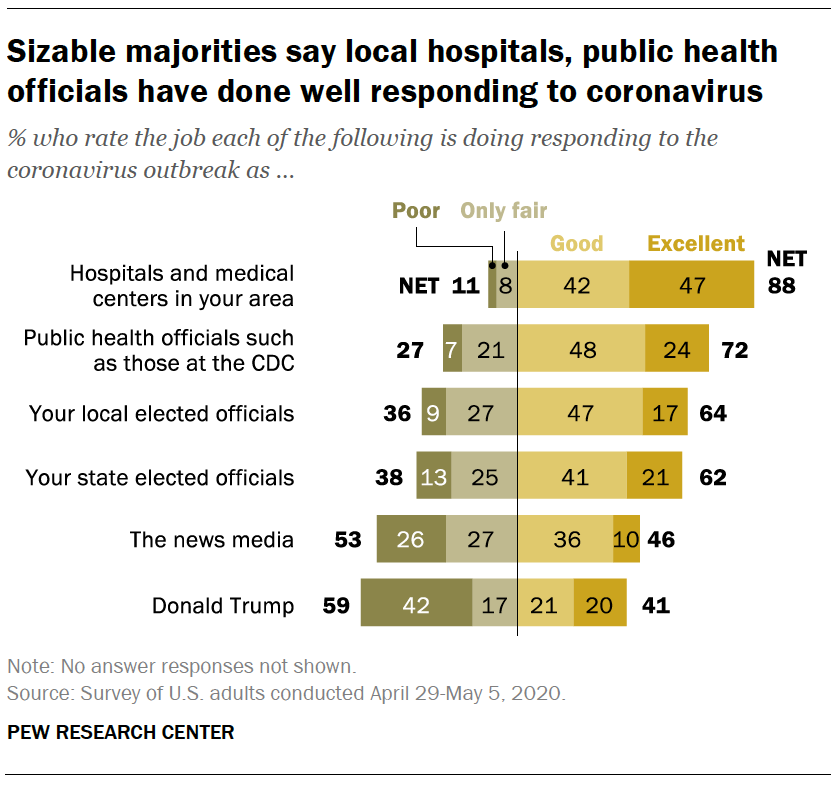
The public is much less positive in evaluations of how the news media and Donald Trump have responded to the coronavirus outbreak. Fewer than half of Americans (46%) say the news media have done a good or excellent job in responding to the outbreak; 53% say they have done a fair or poor job.
An even larger majority of Americans say Donald Trump is doing an only fair (17%) or poor job (42%) responding to the COVID-19 outbreak. About four-in-ten Americans (41%) say Trump is doing an excellent or good job responding to the outbreak.
For the most part, these assessments have become somewhat less positive since March – largely because of changes in opinions among Republicans and Republican-leaning independents. (This is the first time the survey has included local hospitals and medical centers.)
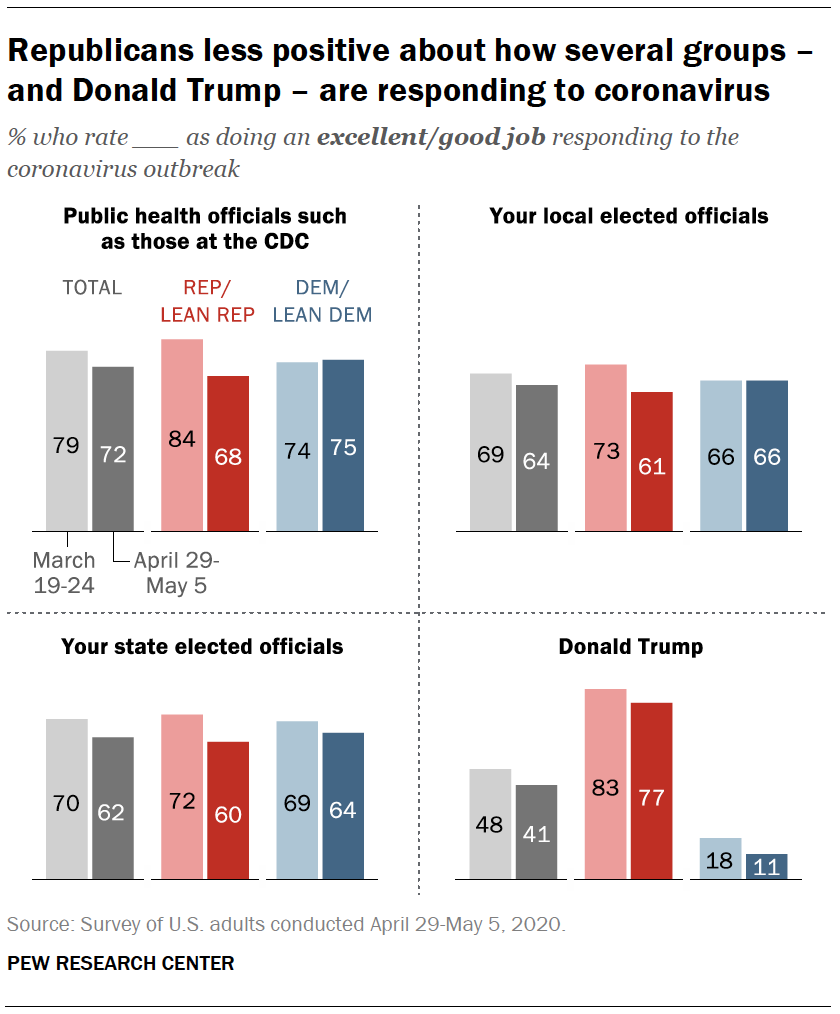
Currently, 72% of Americans say public health officials such as those at the CDC are doing an excellent or good job in response to the coronavirus outbreak (down from 79% in March). The share of Republicans who give public health officials positive ratings has fallen 16 percentage points since then, from 84% t0 68%, while there has been almost no change among Democrats (75% currently).
Similarly, Republicans’ evaluations of their local elected officials (61% currently say they have done an excellent or good job, down from 73% in March) and their state elected officials (from 72% then to 60% today) have become less positive.
Republicans also offer somewhat less positive evaluations of how Trump has handled the outbreak than they did a few months ago: A 77% majority says he has done an excellent or good job, compared with 83% who said this in March.
For the most part, Democrats and Democratic leaners’ ratings for state and local officials and the news media are little changed. But the share of Democrats with positive views of Trump’s handling of the outbreak, already low at 18% in March, has fallen to 11%.
Far more Americans say coronavirus threatens nation’s economy and public health than say this about own finances or health
As has been the case since the coronavirus outbreak began, much larger majorities say it is a major threat to the U.S. economy (88%) and the health of the population (64%) than that it threatens people’s own finances (41%) and health (38%).
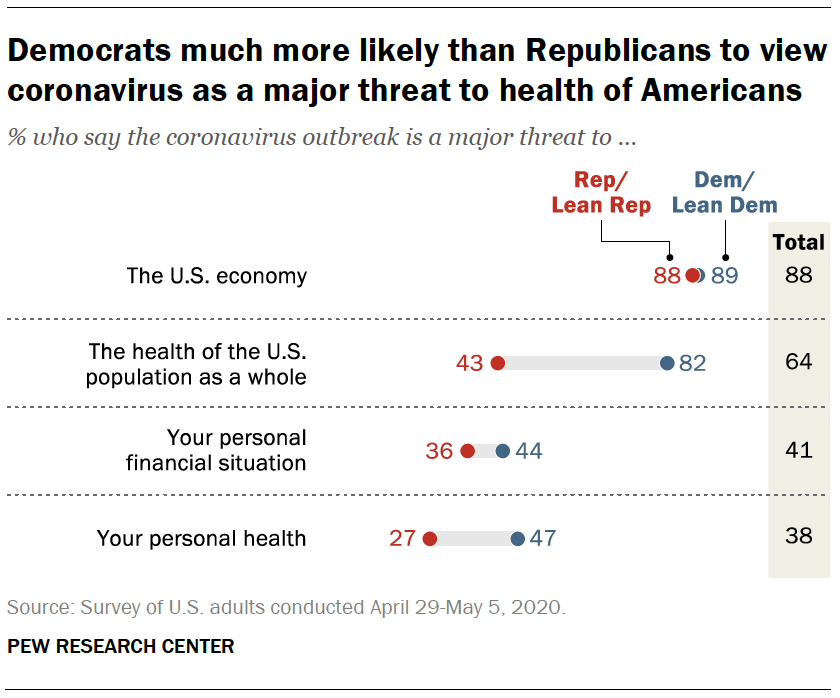
These views are largely unchanged since late March, but the proportion viewing the outbreak as a major threat to their own finances has declined from 49% to 41%.
Notably, there are no significant partisan differences in views of whether the coronavirus threatens the economy: 89% of Democrats and 88% of Republicans say it is a major threat.
However, Democrats also broadly view the outbreak as a major threat to the health of the U.S. population (82%); Republicans, for the most part, do not. Fewer than half (43%) say the outbreak is a major threat to the health of the population.
The partisan differences are more modest in views of the personal impact of the coronavirus. Still, Democrats are somewhat more likely than Republicans to say it is a major threat to their personal finances (44% vs. 36%) and much more likely to regard it as a major threat to their health (47% vs. 27%).
There are also geographic differences in views of the personal threat posed by COVID-19, with those who live in counties most heavily impacted by the virus more likely to see the outbreak as a threat to their personal finances and personal health.
Among adults living in counties with 100 or more reported coronavirus deaths as of May 1, about half (48%) say the outbreak is a major threat to their personal financial situation, compared with 37% of those living in counties with fewer than 10 reported deaths. Meanwhile, 43% of those in the most impacted counties say the outbreak is a threat to their personal health, as do 36% of those in counties that have been moderately impacted and 35% of those in the least impacted counties.
Within the most and least heavily impacted counties, sizable partisan differences remain, particularly in views of the impact of the coronavirus on people’s health. Democrats overall are 20 percentage points more likely than Republicans to view the coronavirus outbreak as a major threat to their personal health; these differences persist in counties most impacted by the outbreak as well as those less affected. Among Republicans in the most impacted counties, 34% see the coronavirus as a major threat to their health; that is much lower than the share of Democrats in the least affected counties who say this (48%).
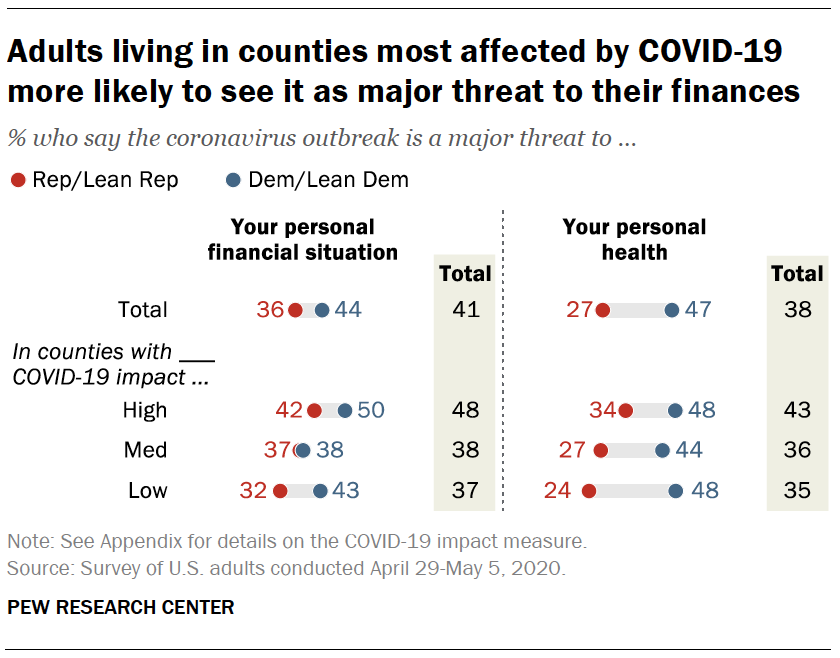
Partisan differences are more modest in views of the impact of the outbreak on personal finances. Still, Democrats who live in counties with at least 100 coronavirus deaths as of May 1 are 8 percentage points more likely than Republicans in those counties to view the outbreak as a major threat to their finances, while Democrats in counties with fewer than 10 deaths are 11 points more likely than Republicans in those counties to view it as a major financial threat.
More young adults view coronavirus as major threat to their finances than to their health
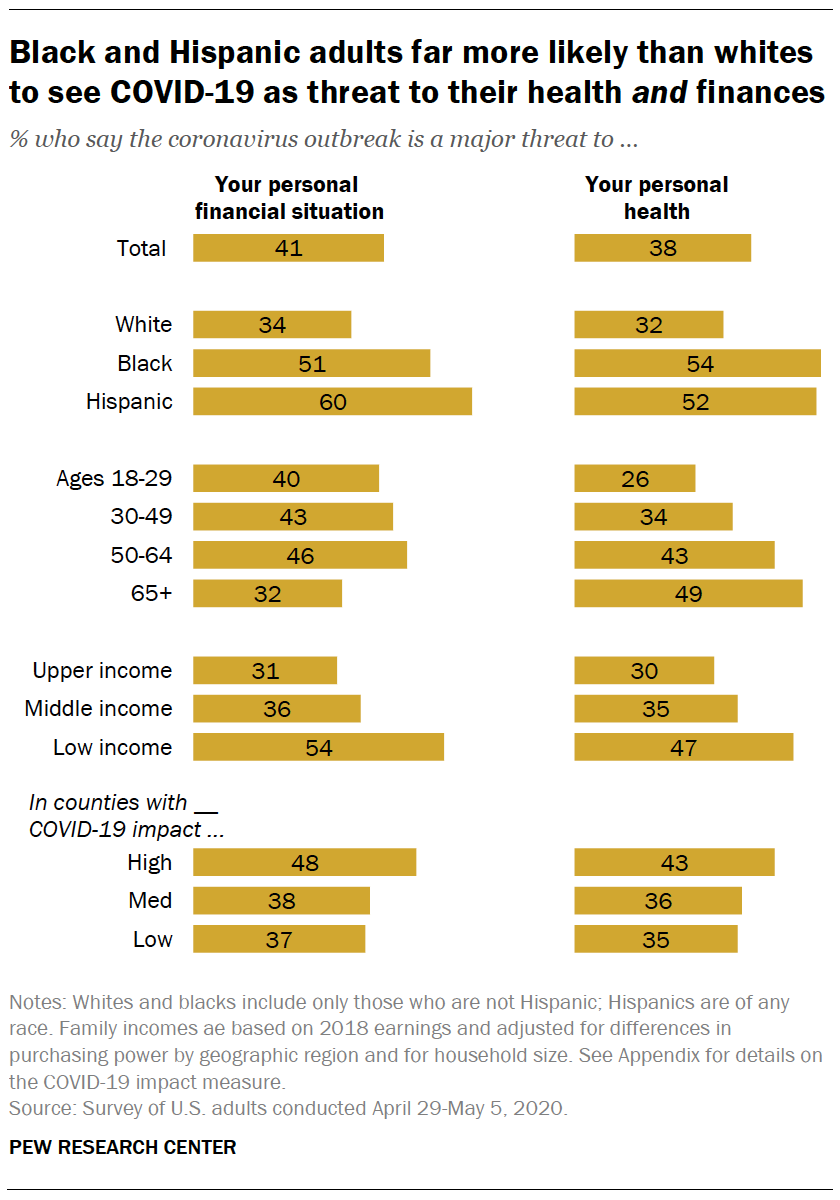
Since the beginning of the coronavirus outbreak, there have been wide differences by race and ethnicity in perceptions of the impact of the coronavirus.
The new survey finds that black and Hispanic adults are far more likely than whites to say the outbreak is a major threat both to their health and finances.
About half of black (54%) and Hispanic (52%) adults say the outbreak is a major threat to their personal health, compared with 32% of whites.
The differences are about as wide in views of the impact on personal finances: 60% of Hispanics and 51% of blacks view the outbreak as a major threat to their finances, compared with 34% of whites.
Younger adults continue to be more likely to view the coronavirus as a major threat to their personal finances than as a major threat to their personal health. Four-in-ten adults ages 18 to 29 say the outbreak is a major threat to their financial situation, while roughly a quarter (26%) say it is a major threat to their health. Adults ages 30 to 49 are 9 percentage points more likely to say the outbreak is a major threat to their finances than to their health.
Among adults ages 50 to 64, similar proportions say the outbreak is a major threat to their finances (46%) and to their health (43%). Adults 65 and older are the least likely to say the coronavirus outbreak is a major threat to their financial situation and the most likely to say it is a major threat to their health.
People living with a lower household income are significantly more likely to view the outbreak as a major threat to both their finances and their health than individuals in higher-income households. Among those in lower-income households, a slim majority (54%) say the virus is a major threat to their finances, compared with about three-in-ten (31%) of those in upper-income households. And nearly half (47%) in lower-income households say it is a major threat to their health, compared with three-in-ten in upper-income households.
Nearly two-thirds of conservative Republicans say states should be mainly responsible for ensuring enough COVID-19 testing
As states across the nation begin to slowly ease their closure orders and reopen their local economies, health experts say expanding the availability of testing for coronavirus is a necessary step in order to safely lift restrictions on public activity.
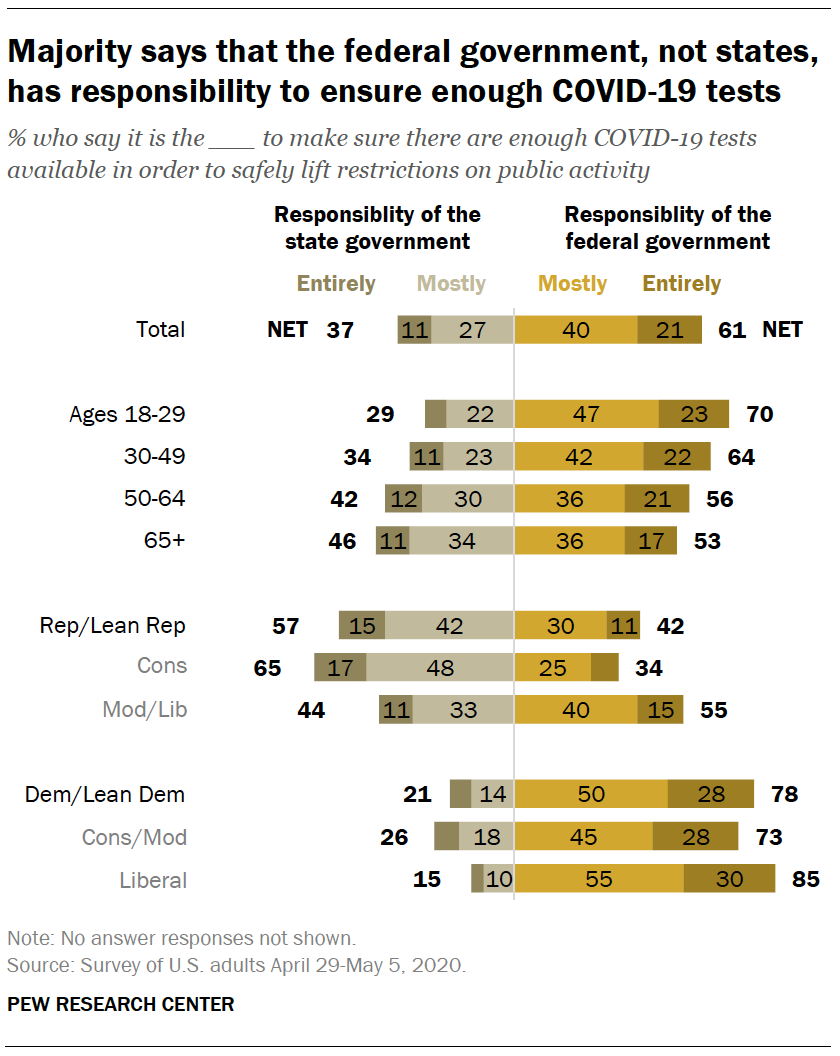
A majority of Americans (61%) say the federal government is mostly (40%) or entirely (21%) responsible in making sure there are enough COVID-19 tests available to the public. About four-in-ten (37%) say this responsibility at least mostly falls on the state government.
Younger adults are more likely than those who are older to say the federal government should take the lead in making testing for COVID-19 widely available. Seven-in-ten adults ages 18 to 29 say the federal government should be responsible for making COVID-19 testing available, the highest share in any age group.
Republicans are ideologically divided in views of whether the states or federal government should be responsible for making sure there are enough COVID-19 tests. Nearly two-thirds of conservative Republicans (65%) say this is the responsibility of a state government; a majority of moderate and liberal Republicans (55%) say it is the federal government’s responsibility. Among Democrats, a larger majority of liberals (85%) than conservatives and moderates (73%) say the responsibility for ensuring an adequate supply of COVID-19 tests lies with the federal government.